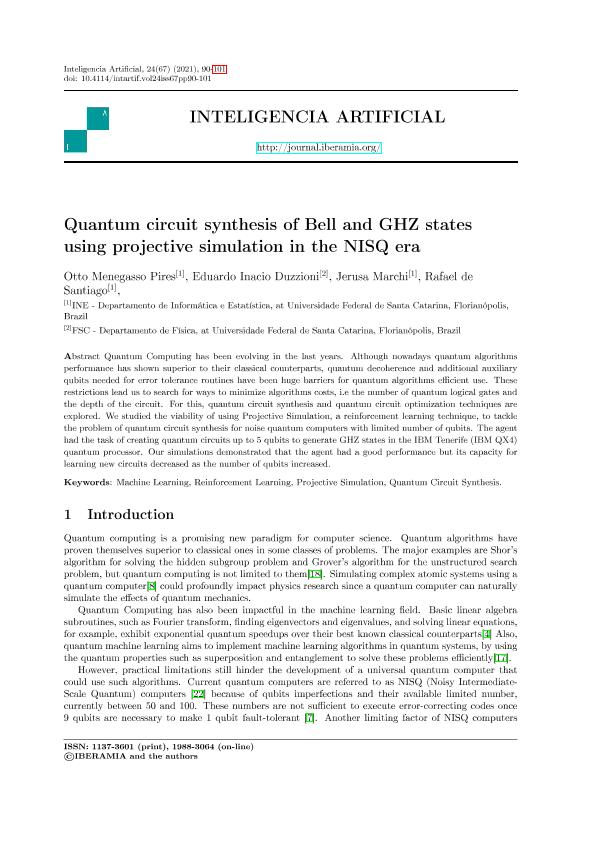Quantum circuit synthesis of Bell and GHZ states

Contenido multimedia no disponible por derechos de autor o por acceso restringido. Contacte con la institución para más información.
| Tag | 1 | 2 | Valor |
|---|---|---|---|
| LDR | 00000cab a2200000 4500 | ||
| 001 | MAP20210024542 | ||
| 003 | MAP | ||
| 005 | 20220911185854.0 | ||
| 008 | 210727e2021 esp|||p |0|||b|spa d | ||
| 040 | $aMAP$bspa$dMAP | ||
| 084 | $a922.134 | ||
| 100 | 1 | $0MAPA20210030222$aMenegasso Pires, Otto | |
| 245 | 1 | 0 | $aQuantum circuit synthesis of Bell and GHZ states$cOtto Menegasso Pires...[et.al] |
| 520 | $aQuantum Computing has been evolving in the last years. Although nowadays quantum algorithms performance has shown superior to their classical counterparts, quantum decoherence and additional auxiliary qubits needed for error tolerance routines have been huge barriers for quantum algorithms efficient use. These restrictions lead us to search for ways to minimize algorithms costs, i.e the number of quantum logical gates and the depth of the circuit. For this, quantum circuit synthesis and quantum circuit optimization techniques are explored. We studied the viability of using Projective Simulation, a reinforcement learning technique, to tackle the problem of quantum circuit synthesis for noise quantum computers with limited number of qubits. The agent had the task of creating quantum circuits up to 5 qubits to generate GHZ states in the IBM Tenerife (IBM QX4) quantum processor. Our simulations demonstrated that the agent had a good performance but its capacity for learning new circuits decreased as the number of qubits increased. | ||
| 650 | 4 | $0MAPA20080572242$aFísica cuántica | |
| 650 | 4 | $0MAPA20080611200$aInteligencia artificial | |
| 650 | 4 | $0MAPA20080553128$aAlgoritmos | |
| 773 | 0 | $wMAP20200034445$tRevista Iberoamericana de Inteligencia Artificial$dIBERAMIA, Sociedad Iberoamericana de Inteligencia Artificial , 2018-$x1988-3064$g15/02/2021 Volumen 24 Número 67 - febrero 2021 , p. 90-101 |

